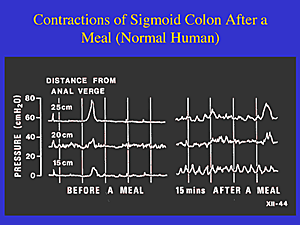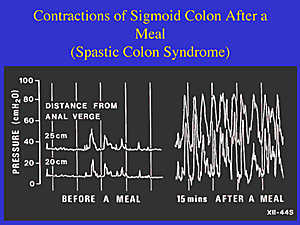| |
 |

For IBS Diarrhea, Constipation, Pain, & Bloating!
Stock Up! Bargains On All
Tummy Care Favorites!
Most Popular Recently »
What if IBS pain is worse than birth?
|
 |
|
| |

June 7, 2011 ~ Scroll down for full newsletter or follow the links:
Ask Heather »
Your Brain? Your Gut? What an IBS Attack Literally Looks Like.
IBS Recipe »
Super Simple Slow Roasted Salmon
News & Research »
The Potential Cure For IBS?!
Special Letter »
Wow, How Things Have Changed! Diana Takes the Plunge.

|
|
Have questions? Call toll free (866) 640-4942.
Outside the US (206) 264 8069.
Enjoy the newsletter!
Heather Van Vorous & Heather's Tummy Care
Celebrating 10 Years of IBS Business!
|
Did a friend send you this newsletter? Sign up here for your own free subscription.

Super Simple Slow Roasted Salmon This is an effortless and almost foolproof way to cook salmon, as the lower, slower cooking time ensures the delicate fish doesn't dry out. The delicious sauce takes just seconds to make, and adds terrific zest. Plus, you'll get extra digestive stability from both the horseradish - a traditional digestive aid - and the Tummy Fiber.
Servings: Makes 4
Ingredients:
1 lb. fresh wild caught salmon fillet, skin on
1/4 tsp salt
1 tsp brown sugar
1 tablespoon dill
Sauce:
1/4 cup Dijon mustard
1 tsp horseradish
1 tsp Acacia Tummy Fiber
Directions:
Preheat oven to 325F. Put salmon in baking dish just large enough to hold fillet in a single layer. Combine salt, sugar, and dill in a small bowl and mix together. Gently rub dill mixture over top of salmon.
Roast, uncovered, until thickest part just starts to flake when a fork is inserted, and fish is barely cooked through. This will take about 15 to 35 minutes, depending on the thickness of your fillet. Start checking the salmon for doneness after 15 minutes, then recheck every 5 minutes until done.
Stir together sauce ingredients. Serve salmon with sauce and rice, boiled potatoes, or on fresh white bread for delicious sandwiches!
Are you just learning how to eat for IBS? A little intimidated at the thought of special IBS recipes? Not quite sure just what makes these recipes special in the first place? Don't worry! Get Eating for IBS and find the answers to all your questions.
~ Heather's Tummy Fiber ~
For IBS Diarrhea AND Constipation

Certified Organic Acacia Senegal ~ Pure Soluble Fiber
The prebiotic fiber that relieves both diarrhea and constipation!
** Very Economical ** Only 4 cents per gram of fiber!
** 100% Acacia Senegal ** Never Low Grade Acacia Seyal
 Wow, How Things Have Changed! Diana Takes the Plunge.
Wow, How Things Have Changed! Diana Takes the Plunge.
Dear Heather,
I found my emails to you from 1 year ago and wow, have things changed since then! I completed the hypnotherapy 100 day plan by Michael Mahoney and I honestly can say I'm 90% cured.
I follow the IBS diet,
make a few recipes from your book Eating for IBS, and take the Tummy Fiber every morning and sometimes back it up with Citrucel and Peppermint Oil Capsules if needed throughout the day. I can even eat some trigger foods in
moderation with no problems at all!
I don't know what I would do without you and that hypnotherapy program - you have both seriously changed my life.
Absolutely use my comments. I was skeptical of hypnotherapy at first but I had to take the plunge. And I'm beyond thrilled I did.
I'd be happy to speak with anyone who is having doubts as well.
Thanks again,
Diana
P.S. Love the Tummy Fiber Travel Packs!
Thank you so much, Diana! You are so right - the IBS hypnotherapy program is amazing! ~ Heather
Did you miss the recent letter from Tiffany, who found help for IBS pain worse than childbirth?
~ Heather's Tummy Tamers Peppermint Oil Capsules ~

Peppermint Oil Caps Called "Drug of Choice for IBS"
Our Peppermint Oil Caps have the added benefits of fennel and ginger oils, and they help prevent abdominal pain, gas, and bloating!
 What's the Only Potential Cure for IBS?
What's the Only Potential Cure for IBS?
I'm often asked if there are any cures for IBS. The answer so far? A definite maybe!
At this point, gut-directed hypnotherapy is the only treatment that works directly on the brain-gut dysfunction underlying all IBS symptoms. This means hypnotherapy can alleviate diarrhea, constipation, pain, gas, bloating, and more. As a result, some researchers have called hypnotherapy the first "cure" for IBS.
While I'm always trying to feature personal feedback from people with IBS who have tried hypnotherapy, it's terrific to see the hard science behind this treatment. Gut-directed hypnotherapy is in fact one of the most thoroughly researched and well-established treatments for all IBS symptoms.
I've compiled a number of significant research articles and reviews on hypnotherapy for IBS below. These clinical trials are drawn from Gut, Lancet, Gastroenterology, and other internationally respected medical journals. The study results are consistent and overwhelmingly positive. For in-depth information about self-hypnosis for IBS, see the IBS Audio Program. ~ Heather
Gastroenterologists Call for Wide Use of Hypnotherapy in IBS
Leading gastroenterologists are calling for hypnotherapy to be used more widely in treating irritable bowel syndrome. Researchers at King's College London note that in one study at Withington Hospital, 12 weeks of hypnotherapy helped 71 percent of patients ease their IBS symptoms for five years after the treatment.
Irritable Bowel Syndrome Audio Program Celebrates Over 10 Years of Success
Called by some "the best kept secret in gastroenterology", the IBS Audio Program 100 developed by Michael Mahoney, Clinical Hypnotherapist at Guardian Medical Centre in Cheshire, England, is now used by IBS sufferers in 41 countries. The IBS Audio Program was developed specifically to manage both the physical and the emotional aspects of IBS. Hypnotherapy has now been listed as a treatment option for IBS in the UK's National Institute for Health and Clinical Excellence (NICE) guidelines.
Hypnotherapy for IBS - Systematic Review Shows Long-Lasting Symptom Relief
Z Gastroenterol. 2009 Nov;47(11):1153-9.
Data from published hypnotherapeutic interventions with approximately 800 patients show long-lasting symptom relief.
Hypnotherapy Relieves More Than Just IBS Symptoms
Int J Clin Exp Hypn. 2009 Jul;57(3):279-92.
This study noted that people with functional gastrointestinal disorders such as irritable bowel syndrome and dyspepsia suffer from a range of severe symptoms that often substantially erode their quality of life. These conditions are notoriously difficult to treat, with many patients failing to improve despite being prescribed a wide variety of conventional medications.
As a consequence, the potential benefits of hypnotherapy have been explored with evidence that this approach not only relieves symptoms but also appears to restore many of the psychological and physiological abnormalities associated with these conditions.
Hypnotherapy Called a Cure for Pediatric Irritable Bowel Syndrome.
2007 Digestive Disease Week Conference, Presentation title: Functional Gastrointestinal Disorders: Psychosocial and Psychotherapy. Abstract 914.
Gut-directed hypnotherapy has been shown to be highly effective in the treatment of adult patients with IBS. This study evaluated the treatment approach in a pediatric population.
53 children between the ages of 8 and 18 years who had been diagnosed with IBS or Functional Abdominal Pain were randomized to standard therapy or to 6 hypnotherapy sessions of 30 minutes over a 3-month period. The endpoints of the study were pain intensity, pain frequency, nausea, headache and appetite. The investigators defined a cure as a greater than 80% improvement in pain.
After 1 year, the cure rate reached 85% for hypnotherapy-treated subjects and 25% for those receiving conventional therapy. The authors concluded, "Gut-directed hypnotherapy is highly superior to conventional therapy in the treatment of children with longstanding FAP or IBS."
Effect of gut-directed hypnotherapy upon quality of life in IBS patients.
J Clin Nurs. 2006 Jun;15(6):678-84.
This study quantified health-related quality of life in a group of 75 irritable bowel syndrome patients and measured changes following a treatment program of nurse-led gut-directed hypnotherapy. It is well recognized that health-related quality of life can be severely impaired in patients suffering from the irritable bowel syndrome. Current conventional treatment for irritable bowel syndrome is often unsatisfactory. This study followed 75 patients and determined that gut-directed hypnotherapy has a very positive impact on health-related quality of life with improvements in psychological well-being and physical symptoms. It appears most effective in patients with abdominal pain and distension.
A 27-Sep-2005 press release featured Peter Whorwell, Professor of Medicine and Gastroenterology in the University's Medical School and Director of the South Manchester Functional Bowel Service, who has been researching the use of gut-directed hypnosis for over 20 years. Most recently, two hundred and fifty patients who have suffered from IBS for over two years were given twelve one-hour sessions, during which they were given an explanation of how the gut works and what causes their symptoms. "IBS is ideal for treatment with hypnosis, as there is no structural damage to the body," explained Professor Whorwell. "During the hypnotherapy, sufferers learn how to influence and gain control of their gut function, and then seem to be able to change the way the brain modulates their gut activity."
Former patient Sonia Pinnock said, "I suffered from IBS and was on medication for nearly 20 years, but could get little relief from my symptoms. Since visiting the clinic for 12 hypnotherapy sessions last year however they've disappeared completely - the difference it's made to my quality of life is indescribable."
Another happy patient Christine Walsh continued, "After my hysterectomy I suffered from IBS for about five years, and it totally ruined my quality of life. I couldn't plan holidays or leisure activities and at work I was often doubled-up in pain. But since having weekly hypnotherapy sessions for three months I've now been free from IBS for five and a half years - the treatment has totally changed my life."
Hypnotherapy Benefits Last at Least Five Years.
Gut. 2003 Nov;52(11):1623-9.
204 patients prospectively completed questionnaires scoring symptoms, quality of life, anxiety, and depression before, immediately after, and up to six years following hypnotherapy. All subjects also subjectively assessed the effects of hypnotherapy retrospectively. 71% of patients initially responded to therapy. Of these, 81% maintained their improvement over time while the majority of the remaining 19% claimed that deterioration of symptoms had only been slight. With respect to symptom scores, all items at follow up were significantly improved on pre-hypnotherapy levels.
Researchers call gut-directed hypnotherapy a "cure" for IBS!
The Best Gut-Directed Self-Hypnosis Program for All IBS Symptoms
 
Gives an average 85% reduction of pain and bowel dysfunction symptoms.
Listen to IBS Audio Program 100 samples!
 What A Brain-Gut Dysfunction Looks Like What A Brain-Gut Dysfunction Looks Like
Irritable Bowel Syndrome, also known as IBS, is defined by the Rome Criteria diagnostic guidelines, and is characterized as a brain-gut dysfunction. What on earth does this mean?
In plain English, it means that IBS symptoms result from a hypersensitivity of the nervous system of the gut (your gut overreacts), along with misinterpretations of the nervous system messages from the gut by the central nervous system and the brain (your brain overreacts to your gut's overreaction).
Basically, this circuit (from gut to brain and brain to gut) appears to be abnormal in patients with Irritable Bowel Syndrome, though the exact abnormalities remain unclear.
(For full information about the brain-gut dysfunction and Irritable Bowel Syndrome overall, get The First Year: IBS, an essential guide to successfully managing the disorder. This is extremely helpful for both the newly diagnosed and those who have been struggling with IBS for years.)
Remarkably, PET scans of the brains of people with IBS show pronounced differences in the activation of certain parts of the brain relating to perception and pain (versus normal individuals). MRI brain scans have shown similar results. Yes, this means that those of us with IBS have a brain disorder, not just a gut disorder.
This also means that IBS is undeniably a physical problem. Simply put, the brain-gut interaction of people with IBS influences their bowel pain perception and motility. In a nutshell, the processing of pain information within the central nervous system varies between normal individuals and those of us with IBS, with the result that we can experience even normal GI contractions as painful.
The interactions between our brains, central nervous systems, and GI systems are just not functioning properly. We have colons that react to stimuli that do not affect normal colons, and our reactions are much more severe.
The end result is heightened pain sensitivity and abnormal gut motility, in the form of irregular or increased GI muscle contractions. It is this gut overreaction and altered pain perception that cause the lower abdominal cramping and accompanying diarrhea and/or constipation that characterize IBS.
The simplest way to break this cycle, stop the gut overreaction, and manage symptoms on a daily basis is to use a prebiotic 100% soluble fiber supplement that's formulated specifically for IBS. That will help regulate your gastrocolic reflex and keep peristalsis normal. This prevents abdominal spasms and cramps, and relieves both diarrhea and constipation.
Interestingly though, while an underlying cause of IBS might well be in our brains, there is still a physical abnormality in the way our colons function. This dysfunction is actually visible (shockingly so) in the medical imaging tests below.

This is a normal gut 15 minutes after a meal.

This is an IBS gut 15 minutes after a meal. Holy cow!
Illustration from Irritable Bowel Syndrome (IBS): Examining New Findings and Treatments. Authors: Marvin M. Schuster, MD; Michael D. Crowell, PhD; Nicholas J. Talley, MD, PhD. Continuing Medical Education Activity, Johns Hopkins School of Medicine, October 26, 2000, via Medscape. Used with permission.
Typically, the majority of the time the colon is still. However, following a meal, the stomach triggers something called the "gastrocolic reflex." This response occurs when food passes from the stomach into the upper part of the small intestine.
Normally, the gastrocolic reflex causes periodic contractions of the colon at different points along its length, at timed intervals. These segmented contractions regulate the flow of waste, and keep it in contact with the bowel wall, allowing water to be absorbed.
Finally, peristaltic contractions of the colon propel the waste to the rectum and then out of the anus via evacuation by a bowel movement. Total average transit time through the entire 30-foot digestive system, from mouth to anus, is between 12-24 hours for healthy individuals with high-fiber diets, and 48-72 hours for most Americans eating a typical Western (high fat/animal protein, low fiber) diet.
Where Things Go Wrong...
Unfortunately, how the digestive tract is supposed to work is not exactly how it does work for those of us with IBS. The key problem seems to be with the gastrocolic reflex. Specifically, research has found that many IBS patients have highly abnormal ones.
Our colons have disorganized and significantly more violent and prolonged contractions (leading to diarrhea), or almost no contractions at all (resulting in constipation).
Amazingly, researchers have found that while healthy people have between 6-8 peristaltic contractions in their colon within a 24-hour period, IBS sufferers with diarrhea have as many as 25 peristaltic contractions per day, and constipation-prone IBS patients have almost none.
Add to this bowel dysfunction the heightened pain perception resulting from our abnormal brain-gut interactions, and you've got the recipe for disaster...spelled I-B-S.
There's vivid demonstration of this in the images above. They show the huge difference between the after-meal contractions of a normal person's lower (sigmoid) colon and the contractions of the lower (sigmoid) colon in a person with IBS. The left half of both illustrations shows the colon contractions before a meal, and the rates are very similar and quite modest.
Just fifteen minutes after eating, however, the differences in colon contractions as shown on the right sides of the graphics are dramatic. Given the almost off-the-chart severity of the spasms (measured by the vertical axis in terms of pressure) in the IBS patient, it's easy to literally see exactly why the pain and bowel dysfunctions of this disorder can be so extreme.
As you read these graphics, don't be intimidated by the "distance from anal verge" legend for the horizontal axis of the chart. All that term basically means is how far up into the colon from the anus the contractions are being measured (they're either 15, 20, or 25 centimeters up into the colon from the outside of the anus).
In other words, the contractions triggered by the gastrocolic reflex from the stomach are affecting the very lower end of the colon just fifteen minutes after a meal has been eaten. This gives a crystal clear explanation for how an attack can hit you so fast and so hard after - or even while - eating.
Personally, I can't look at these charts without having flashbacks to all the times I've had to rush from the dinner table before I'd even finished my meal. The worst memory of all is from a vacation in Hawaii when I was twelve, and had been allowed to splurge and order lobster.
Unfortunately, a virgin pina colada (in hindsight, it was the high-fat coconut milk and high fructose pineapple juice on an empty stomach that did me in) triggered an attack before my meal had even arrived at the table. I spent the entire evening in a cold sweat vomiting from the pain in a bright pink hotel ladies lounge, while my family ate my lobster.
It's not much consolation to finally get a scientific explanation for exactly what happened to me that night, but I suppose it's nice to no longer be completely in the dark. (And I haven't had a pina colada since.)
So now that you know it's a brain-gut dysfunction that underlies all IBS symptoms, what can you actually do about it?
My top recommendation is gut-directed hypnotherapy. It's one of the most promising methods of treating IBS permanently (researchers have actually called it a cure).
This is the only treatment that actually deals directly with, and can successfully change, the brain-gut dysfunction. See the News and Research section above for an overview of articles and reviews of hypnotherapy for IBS, including researchers' conclusions that hypnotherapy not only relieves IBS symptoms but also appears to restore many of the psychological and physiological abnormalities associated with these symptoms.
In other words, if your goal is to physically change the brain-gut disorder that actually causes IBS symptoms in the first place, gut-directed hypnotherapy is not just the only option, it is a truly terrific one.
Hypnotherapy specific to IBS has long been a mainstream treatment in Great Britain, where this treatment was originally pioneered. However, it has now been embraced by US gastroenterologists and GI researchers as well. It is one of the most thoroughly researched and well-established therapies for all IBS symptoms, and the only one so far that has demonstrated potential for permanent results.
There is much to gain and literally nothing to lose by trying hypnotherapy for IBS to break the cycle of the brain-bowel dysfunction.
~ Heather
Did you miss the recent Ask Heather and how to get Heather's Tummy Care in local stores and get a 50% rebate?


Shop at Heather's Tummy Store for IBS
HelpForIBS.com
The only store that's just for IBS - so we only carry the very best

You're on this newsletter list because you have expressed interest in IBS news and information.
Change your newsletter email address here.
If you are viewing this newsletter on a website and would like to subscribe for email delivery, please "Join the IBS Newsletter" here.
ANTI-SPAM PRIVACY & SECURITY POLICY
HelpForIBS.com
Heather's Tummy Care
80 S. Washington St, #304
Seattle, WA 98104 USA
© 2011 Heather Van Vorous, Heather's Tummy Care. All rights reserved.
USA Copyright Office Registration Number TXU 1-270-858 and others.
|
|
| |